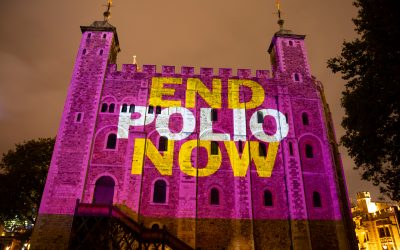COP26 was the first time Rotary International had an official delegation, which I was privileged to lead in my role as Dean of Rotary Representatives to the United Nations and international agencies.
Rotary has had observer status since the formation of the United Nations in 1947. COP26 was attended by more than 190 country delegations, as well as 1,600 inter-governmental and non-governmental organisations (NGOs).
Listen to this article
Rotary’s role was participatory with events taking place in the Delegations’ Pavilions in the Blue Zone.
Partly because of Covid, there was little opportunity for observers to engage in the main discussions or influence them.
I would sum up Rotary’s attendance at COP26 as putting Rotary on the global environment map.”
Because of the scale of the conference and the small size of the Rotary delegation, it was essential to have a clear focus based on existing relationships to achieve anything meaningful.
My main focus was with the 54 countries of the Commonwealth, building on engagement over the last seven years with the Commonwealth Secretariat and High Commissioners while maximising the opportunity since Rotary President, Shekhar Mehta, is from India, the largest Commonwealth country.
I had five priorities at COP26:
- High-level engagement of the Rotary International President with government ministers and heads of NGOs – achieved by working with the Commonwealth Blue Charter team on the high-level round table discussion on mangroves, attended by the Secretary-General of the Commonwealth, plus seven environment ministers or their ambassadors, as well as experts from NGOs and academia.
- Strengthening relations with delegates from United Nations agencies including the UN Framework Convention on Climate Change, the UN Environment Programme (UNEP), UN-Habitat, key governments, other international agencies and NGOs. This was achieved by attending many side events and one-to-one meetings during COP26.
- Creating opportunities for action by developing environmental service projects with partners – achieved through the round table discussions and commitment to start mangrove projects in seven countries, as well as gender-based projects following several bilateral meetings with the President, Shekhar Mehta.
- Giving young people a voice – achieved by working with Helensburgh Garelochside Rotary on the schools’ poster competition, which was funded from the Dean’s budget.
- Giving Rotary in Scotland a platform to create awareness – achieved by working with Helensburgh Garelochside Rotary who helped me organise a reception at the Trades Hall, attended by Glasgow civic dignitaries, ministers, NGO representatives and Scottish Rotarians.
I would sum up Rotary’s attendance at COP26 as putting Rotary on the global environment map.
I received numerous comments from delegates about how pleased they were to see Rotary participating, and many requests to work with Rotary going forward.
The importance of partnerships and involving civil society was mentioned in most meetings I attended.”
The importance of partnerships and involving civil society was mentioned in most meetings I attended.
We can build on it for COP27 in Egypt in a year’s time by involving our Rotary representatives to key agencies in Africa, including UNEP, UN-Habitat, African Union, African Development Bank, and UNICEF.


























































